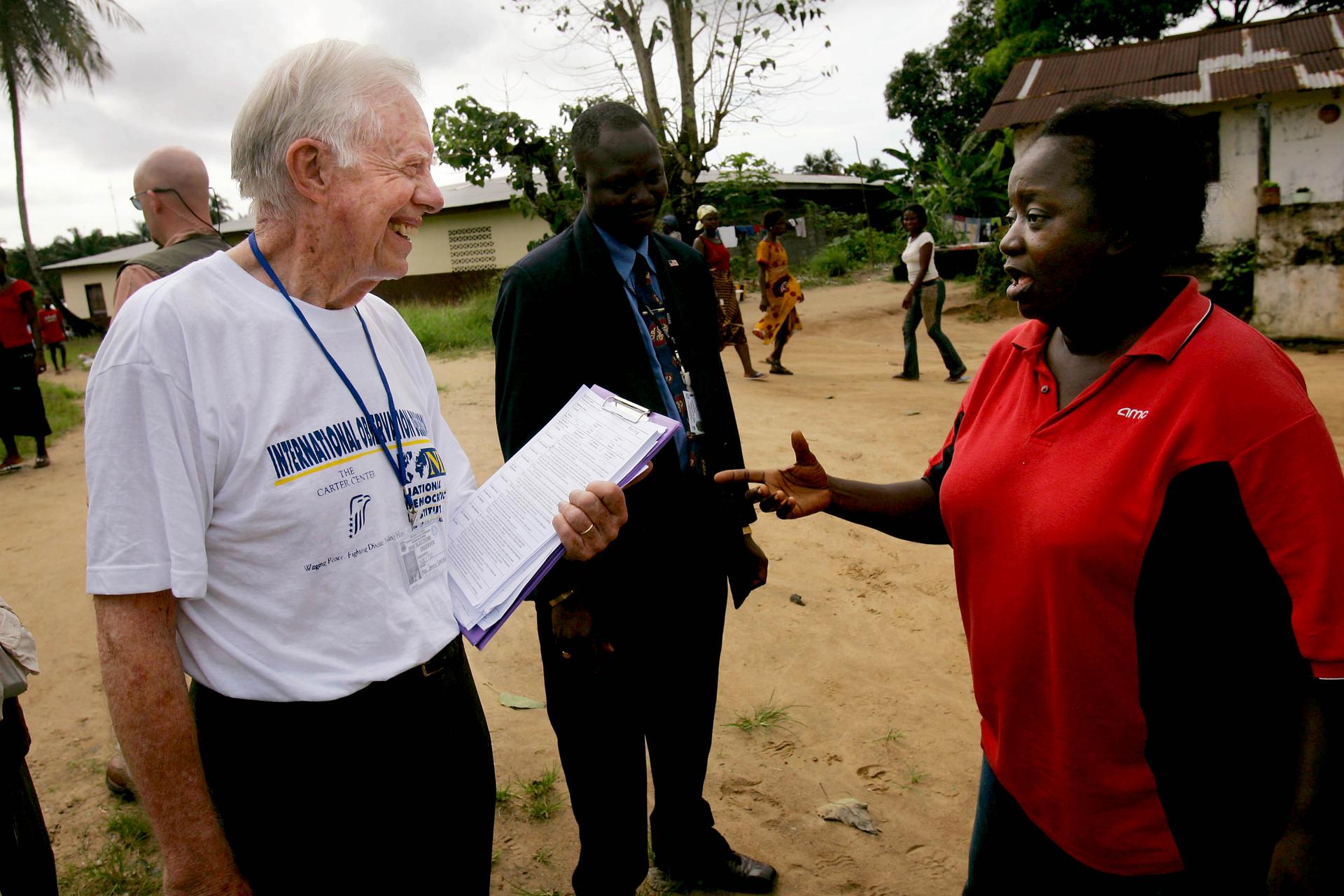Jimmy Carter says Bible no justification for discriminating against women
Former US president Jimmy Carter (L) talks with a Liberian woman in October 2005 in Monrovia, Liberia. The Carter Center, founded by Carter to promote peace initiatives and health issues worldwide, is in Liberia to monitor the elections along with the National Democratic Institute.
BOSTON, Mass. — Former US president Jimmy Carter said there is no doubt in his mind that the Bible, if correctly interpreted, advocates gender equality.
Unfortunately, as he told a crowd of about 700 at the John F. Kennedy Presidential Library in Boston on Thursday evening, very often the Bible is used as the basis for discrimination against women.
“People use holy scriptures that are carefully selected to show women are not equal in the eyes of God,” he said, adding that there is no evidence in the Bible that Jesus Christ ever treated women as inferior to men. The line drew applause from the audience.
The conversation, led by MSNBC host Ronan Farrow, focused around Carter’s recent book, "A Call to Action: Women, Religion, Violence, and Power," in which he recounts his experiences advocating for gender equality.
In the book, released in March, Carter demands that religion become a moral force in women’s rights issues, especially as it is so often used to oppress. While he admits that some biblical stories or verses could be read as misogynistic, Carter believes that the adoption of anti-female interpretations are more about power than truth.
“If men with religious authority wish to remain in power, they can accept the version they prefer,” he wrote.
Carter is a deeply religious man who still teaches weekly Sunday school, and spent time working as a missionary with his wife, spreading the message of Jesus Christ. He recounted how he broke with his church after more than 70 years in 2000, when the Southern Baptist
Convention adopted a slew of rules limiting the public role of women, such as forbidding them to serve as church deacons or, in some cases, teach classes with any male students.
The book focuses mostly on Christian communities, and particularly how Christian values can be distorted around the world to support practices like female circumcision. But while attention is often paid to abuses against women and girls across the seas, Carter — who turned 90 last month — was also quick to point out problems in the United States.
“These same kind of things happen in the US,” he said, after detailing abuses he encountered in Egypt, China and India. “The two great institutions in the US are the military and the universities, including Harvard, where sexual assault is prevalent.”
He went on to quote statistics on underreported rapes on campuses and the lack of consequence for convicted assailants in the military.
The conversation also touched on Carter’s experience growing up in the deeply segregated South, where “it was American law and Christian law that white people were superior to blacks.”
He said even the white people who disagreed with the discriminatory atmosphere stayed silent, because they benefitted from the culture of privilege, and compared it to men today who don’t protest gender inequality, finding it easier to accept the benefits of being male.
While some might question Carter’s unwavering faith that there is no gender discrimination in the Bible, there can be little question to the goodwill he possesses on behalf of the world’s oppressed women and girls.
In fielding questions from the audience, Carter addressed broader issues of concern in modern America, and spoke out strongly against what he described as human rights violations in both the Obama and Bush administrations.
He was especially strident on privacy issues, saying he believes the actions of Edward Snowden were “very beneficial to our country,” adding that in his correspondence to “unpopular world leaders” including the Castros and the North Korea leadership, he always handwrites the letters and sends them via post office, to avoid surveillance.
He spoke passionately about the importance of the Universal Declaration of Human Rights, though Carter believes that such a document would never be passed today.
“Congress would never pass it!” he said.
Carter also spoke about his experience with the Iranian hostage crisis, saying he supports the US policy to not pay ransoms when Americans are kidnapped, and that the US should encourage all other countries to follow suit, removing some of the encouragement to kidnap.
Since serving as the 39th American president, Carter has focused on humanitarian efforts around the world, and was awarded the Nobel Peace Prize in 2002 for his work. He has authored 28 books.
Every day, reporters and producers at The World are hard at work bringing you human-centered news from across the globe. But we can’t do it without you. We need your support to ensure we can continue this work for another year.
Make a gift today, and you’ll help us unlock a matching gift of $67,000!
